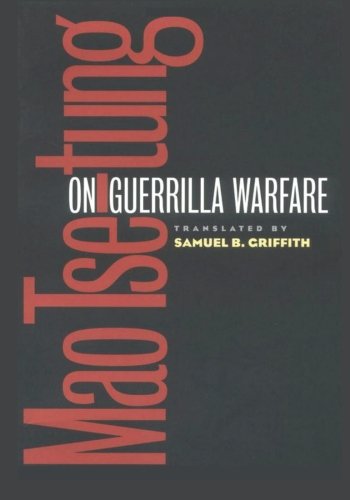Mao Tse-tung on Guerrilla Warfare - Tapa blanda

This reference publication is Mao Tse-tung's thoughts and philosophy of guerrilla warfare. It gives the reader a chance to learn about this type of warfare from one who lived and fought as a guerrilla for most of his adult life. One of the most influential documents of our time, Mao Tse-tung's publication on guerrilla warfare has become the basic textbook for waging revolution in underdeveloped and emergent areas throughout the world. Recognizing the fundamental disparity between agrarian and urban societies, Mao advocated unorthodox strategies that converted deficits into advantages: using intelligence provided by the sympathetic peasant population; substituting deception, mobility, and surprise for superior firepower; using retreat as an offensive move; and educating the inhabitants on the ideological basis of the struggle. This radical new approach to warfare, waged in jungles and mountains by mobile guerrilla bands closely supported by local inhabitants, has been adopted by other revolutionary leaders from Ho Chi Minh to Che Guevara. Mao wrote “On Guerrilla Warfare” in 1937 while in retreat after ten years of battling the Nationalist army of Chiang Kai-shek. Twelve years later, the Nationalist Chinese were rousted from the mainland, and Mao consolidated his control of a new nation, having put his theories of revolutionary guerrilla warfare to the test. Established governments have slowly come to recognize the need to understand and devise means to counter this new method of warfare. Samuel B. Griffith's classic translation makes Mao's treatise widely available and includes a comprehensive introduction that profiles Mao, analyzes the nature and conduct of guerrilla warfare, and considers its implications for American policy. The book was translated and published with an introduction by Samuel B. Griffith, Brigadier General, USMC (Ret.), in 1961.
"Sinopsis" puede pertenecer a otra edición de este libro.
About the Author:
Mao Zedong or Mao Tse-tung; December 26, 1893 – September 9, 1976), also known as Chairman Mao, was a Chinese communist revolutionary, poet, political theorist and founding father of the People's Republic of China, which he governed as the Chairman of the Communist Party of China from its establishment in 1949, until his death in 1976. His Marxist–Leninist theories, military strategies, and political policies are collectively known as Maoism or Marxism-Leninism-Maoism. Born the son of a wealthy farmer in Shaoshan, Hunan, Mao adopted a Chinese nationalist and anti-imperialist outlook in early life, particularly influenced by the events of the Xinhai Revolution of 1911 and May Fourth Movement of 1919. Mao adopted Marxism–Leninism while working at Peking University and became a founding member of the Communist Party of China (CPC), leading the Autumn Harvest Uprising in 1927. During the Chinese Civil War between the Kuomintang (KMT) and the CPC, Mao helped to found the Chinese Workers' and Peasants' Red Army, led the Jiangxi Soviet's radical land policies and ultimately became head of the CPC during the Long March. Although the CPC temporarily allied with the KMT under the United Front during the Second Sino-Japanese War (1937–45), after Japan's defeat, China's civil war resumed and in 1949 Mao's forces defeated the Nationalists who withdrew to Taiwan. On October 1, 1949, Mao proclaimed the foundation of the People's Republic of China (PRC), a one-party state controlled by the CPC. In the following years Mao solidified his control through a campaign of classicide against landlords,[1] and a mass purge of perceived enemies of the state he termed "counterrevolutionaries" alleged to have caused between 2,000,000[2] to 6,000,000deaths. (Mao himself admitting 800,000 deaths in the classicide and 712,000 in the suppression of counterrevolutionaries). In 1957, he launched the Great Leap Forward campaign that aimed to rapidly transform China's economy from an agrarian economy to an industrial one. The campaign contributed to a widespread famine, whose death toll is estimated at between 15,000,000 and 55,000,000. In 1966, he initiated the Great Proletarian Cultural Revolution, a program to remove "counterrevolutionary" elements of Chinese society that lasted 10 years and which was marked by violent class struggle that killed 400,000 to 10,000,000 people and caused widespread destruction of cultural artifacts and unprecedented elevation of Mao's personality cult.
Language Notes:
Text: English (translation)
Original Language: Chinese
Original Language: Chinese
"Sobre este título" puede pertenecer a otra edición de este libro.
- EditorialCreateSpace Independent Publishing Platform
- Año de publicación2014
- ISBN 10 1499610505
- ISBN 13 9781499610505
- EncuadernaciónPaperback
- Número de páginas130
- Valoración
(Ningún ejemplar disponible)
Buscar: Crear una peticiónSi conoce el autor y el título del libro pero no lo encuentra en IberLibro, nosotros podemos buscarlo por usted e informarle por e-mail en cuanto el libro esté disponible en nuestras páginas web.
Crear una petición
